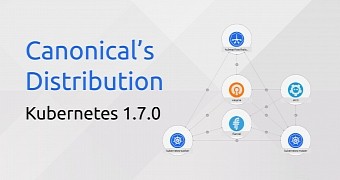Canonical, through Marco Ceppi, today announced the general availability of its distribution of pure-upstream Kubernetes 1.7 for users of the Ubuntu Linux operating system.
Canonical's Distribution of Kubernetes, or CDK for short, is an initiative that provides Ubuntu users with a production-grade method for installing, configuring, and managing Kubernetes lifecycle operations. Today, Canonical upgraded its distribution of Kubernetes to support the latest and most advanced Kubernetes 1.7 upstream release of the production-grade container orchestration tool.
"This is a Canonical distribution of pure-upstream Kubernetes, designed for ease of deployment and operations on public clouds and on-premise on bare metal, VMWare, or OpenStack," says the company in a press release. "The Canonical distribution of Kubernetes is also easy to spin up on developer laptops using LXD containers for component isolation and distributed system simulation."
Here's what's new in Canonical Distribution of Kubernetes 1.7
Besides being based on Kubernetes 1.7, which is a major release sporting numerous attractive features, Canonical Distribution of Kubernetes 1.7 also comes with a bunch of new features of its own, including symmetric key authentication support for components and users as default, as well as LXD pure-container hypervisor deployment for development and hyper-dense environments.
Additionally, it offers robust scaling and upgrade operations for storage and cloud computing, along with consistent operations across popular cloud services like Google Cloud Engine, Amazon Web Services (AWS), Microsoft's Azure, Rackspace, and Oracle Cloud, but also across multiple enterprise virtualisation infrastructures.
On top of that, Canonical Distribution of Kubernetes 1.7 introduces a much more secure-by-default cluster configuration, as Canonical engineers have replaced the self-signed x.509 certificate authentication with a token auth for cluster components, though there's also a basic auth available for the default cluster admin user.
Canonical provides in-depth upgrade instructions for those who want to up their game and upgrade from the Canonical Distribution of Kubernetes 1.6 or Canonical Distribution of Kubernetes 1.5. To upgrade from CDK 1.5.x series, you'll have to upgrade to CDK 1.6 first and then to CDK 1.7. To update your cluster authentication credentials, check out the announcement.

 14 DAY TRIAL //
14 DAY TRIAL //